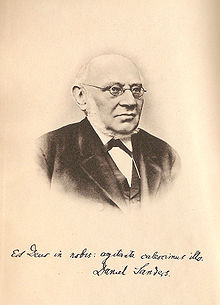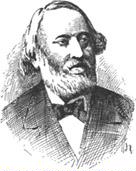
Daniel Sanders (November 12, 1819, Strelitz –March 11, 1897, Strelitz) was a German lexicographer of Jewish parentage. He is famous for lexicons and dictionaries ( Der Große Muret Sanders ).

Daniel Sanders (November 12, 1819, Strelitz –March 11, 1897, Strelitz) was a German lexicographer of Jewish parentage. He is famous for lexicons and dictionaries ( Der Große Muret Sanders ).
Sanders received an elementary education in his local Jewish school and went on to the Gymnasium Carolinum in the neighbouring city of Neustrelitz. From there he moved to the universities of Berlin and Halle to study classical and modern languages, mathematics, and natural history, leaving with a doctorate in philosophy. From 1842 to 1852, he was a school teacher at his own former elementary school in Altstrelitz. [1]
In 1852 Sanders began a detailed response to the Grimms' Deutsches Wörterbuch – of which he was very critical – leading to the publication of his own dictionary of the German language, Wörterbuch der Deutschen Sprache published from 1859 to 1865. This was followed by his Ergänzungswörterbuch der Deutschen Sprache (1878–1885). Among others of his works in the same field are Fremdwörterbuch (1871), Wörterbuch der Hauptschwierigkeiten in der Deutschen Sprache (1872) and Lehrbuch der Deutschen Sprache für Schulen in 3 Stufen (1888). Sanders laid down his views in his Katechismus der Deutschen Orthographie (1856) and was an active member of the orthographical conference in Berlin in 1876. [1]
Sanders also published a translation in verse of the Song of Songs (1866), and wrote some poems titled Heitere Kinderwelt (1868). In 1887 he founded the Zeitschrift fur die Deutsche Sprache, which he edited almost until his death at Altstrelitz in the spring of 1897. [1]

Jacob Ludwig Karl Grimm, also known as Ludwig Karl, was a German author, linguist, philologist, jurist, and folklorist. He formulated Grimm's law of linguistics, and was the co-author of the Deutsches Wörterbuch, the author of Deutsche Mythologie, and the editor of Grimms' Fairy Tales. He was the older brother of Wilhelm Grimm; together, they were the literary duo known as the Brothers Grimm.

The Duden is a dictionary of the Standard High German language, first published by Konrad Duden in 1880, and later by Bibliographisches Institut GmbH. The Duden is updated regularly with new editions appearing every four or five years. As of December 2020, it is in its 28th edition. It is printed as twelve volumes, with each volume covering different aspects of the German language such as loanwords, etymology, pronunciation, synonyms, etc.

Friedrich Kluge was a German philologist and educator. He is known for the Etymological Dictionary of the German Language, which was first published in 1883.

Johann Christoph Adelung was a German grammarian and philologist.

Johann Peter Adolf Erman was a German Egyptologist and lexicographer.

Langenscheidt is a German publishing company that specializes in language reference works. In addition to publishing monolingual dictionaries, Langenscheidt also publishes bilingual dictionaries and travel phrase-books.

Fritz Mauthner was an Austrian philosopher and author of novels, satires, reviews and journalistic works. He was an exponent of philosophical scepticism derived from a critique of human knowledge and of philosophy of language.

Joachim Heinrich Campe was a German writer, linguist, educator and publisher. He was a major representative of philanthropinism and the German Enlightenment.

Konrad Alexander Friedrich Duden was a Gymnasium teacher who became a philologist. He founded the well-known German language dictionary bearing his name Duden.
Rudolf von Raumer was a German philologist and linguist, known for his extensive research of the German language. He was the son of geologist Karl Georg von Raumer.

David Cassel was a German historian and Jewish theologian.
A reverse dictionary is a dictionary alphabetized by the reversal of each entry:
Ernst Friedrich Kärcher was a German educator and philologist born in Ichenheim, a village in Baden-Württemberg. He is remembered as an author of numerous Latin dictionaries.
The Wörterbuch der ägyptischen Sprache, abbreviated Wb in bibliographic references, is a large German-language dictionary of the Egyptian language published between 1926 and 1961 by Adolf Erman and Hermann Grapow. It is a comprehensive work encompassing 3000 years of linguistic history, including Old, Middle, and Late Egyptian as well as hieroglyphic inscriptions of the Classical Greco-Roman period. The dictionary contains approximately 16,000 headwords in five main volumes, two secondary volumes, and five volumes of primary source references. It is therefore the largest and most complete printed dictionary of Ancient Egyptian in existence.

Schweizerisches Idiotikon is an ongoing, major project of lexicography of the Swiss German dialects. Publication began in 1881 and is projected to be complete by 2022. Its scope includes the language since the end of the classical Middle High German period and as such also represents the historical dictionary of the dialects of German-speaking Switzerland, and is one of the most detailed treatments of the Early Modern High German language in general. As of 2010, it contains 150,000 words.

Gustav Langenscheidt was a German language teacher, book publisher, and the founder of Langenscheidt Publishing Group.
The Deutsches Rechtswörterbuch (DRW) or Dictionary of Historical German Legal Terms is a historic legal dictionary developed under the aegis of the Heidelberg Academy of Sciences and Humanities. The research unit took up work in 1897 and until today has completed 93,155 articles, ranging from Aachenfahrt to selbzwölft. These have been published in 12 consecutive volumes and are also freely accessible online. In course of its research, the DRW also touches upon sources in Old English, of Hanseatic provenance and Pennsylvania German. The research unit will presumably conclude its work in 2036.
The German language developed differently in East Germany (DDR), during its existence as a separate state from 1949 to 1990, from the German of West Germany because of significant differences in the country's political and socio-cultural environment. Additionally, from the late 1960s onwards the political leaders of the DDR were intent on affirming the independence of their state by "isolationist linguistic politics" with the objective of demarcating East Germany from West Germany by actively reducing the unity of the German language.
Wolfgang Pfeifer was a German scholar and linguist.